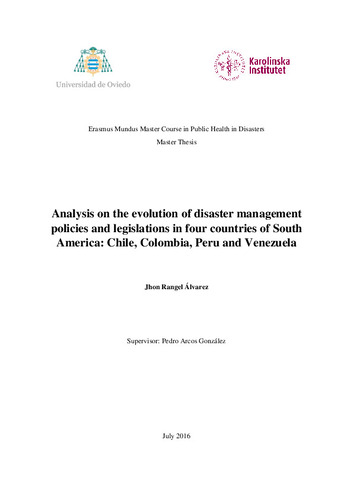Analysis on the evolution of disaster management policies and legislations in four countries of South America: Chile, Colombia, Peru and Venezuela
Autor(es) y otros:
Director(es):
Palabra(s) clave:
Disaster management
Disaster policies
Public health
Fecha de publicación:
Serie:
Máster Erasmus Mundus en Salud Pública y Desastres=Erasmus Mundus Master Course in Public Health in Disasters
Descripción física:
Resumen:
Background: Disaster management has considerable impact on the wellbeing of the population. Policies and legislations for disaster management are determinants of health, and as such, it is relevant to analyze their evolution and current condition in order to gain a better understanding of their role on the population’s welfare. The aim of this study was to analyze the evolution of the policies and legislations for disaster management in Chile, Colombia, Peru, Venezuela and in the global context; and to compare the progress made in policies and legislations for disaster management in these four countries. Methods: Legal documents, laws, decrees, legislations, grey literature and information provided by official institutions in the field of disaster management were reviewed in order to describe the chronological evolution of policies and legislations regarding disaster management in four countries of South America: Chile, Colombia, Peru and Venezuela was conducted. Findings: Venezuela issued the first disaster related legislation in 1936, Chile and Colombia in 1965, while Peru in 1972. The four countries modified their disaster policies periodically. Nevertheless, it was not possible to find any documents related to disaster management in Venezuela from 1971 to 1999. The most recent legal development in the disaster field, amongst the countries included in this study, was made in Colombia in 2016. The terminology used in disaster management legislations in the four countries was similar. Conclusions: The United Nations General Assembly has played a relevant role in the development of policies to reduce disaster risk globally. Differences in the implementation of certain legislations in the group of countries included in this study were found, in years of issue and the scope of action. Nevertheless, the terminology, the objectives and the means to achieve them is, in certain ways, similar for all of them, evidencing the social similarities that Chile, Colombia, Peru and Venezuela hold when it comes to disaster management.
Background: Disaster management has considerable impact on the wellbeing of the population. Policies and legislations for disaster management are determinants of health, and as such, it is relevant to analyze their evolution and current condition in order to gain a better understanding of their role on the population’s welfare. The aim of this study was to analyze the evolution of the policies and legislations for disaster management in Chile, Colombia, Peru, Venezuela and in the global context; and to compare the progress made in policies and legislations for disaster management in these four countries. Methods: Legal documents, laws, decrees, legislations, grey literature and information provided by official institutions in the field of disaster management were reviewed in order to describe the chronological evolution of policies and legislations regarding disaster management in four countries of South America: Chile, Colombia, Peru and Venezuela was conducted. Findings: Venezuela issued the first disaster related legislation in 1936, Chile and Colombia in 1965, while Peru in 1972. The four countries modified their disaster policies periodically. Nevertheless, it was not possible to find any documents related to disaster management in Venezuela from 1971 to 1999. The most recent legal development in the disaster field, amongst the countries included in this study, was made in Colombia in 2016. The terminology used in disaster management legislations in the four countries was similar. Conclusions: The United Nations General Assembly has played a relevant role in the development of policies to reduce disaster risk globally. Differences in the implementation of certain legislations in the group of countries included in this study were found, in years of issue and the scope of action. Nevertheless, the terminology, the objectives and the means to achieve them is, in certain ways, similar for all of them, evidencing the social similarities that Chile, Colombia, Peru and Venezuela hold when it comes to disaster management.
Descripción:
Máster Erasmus Mundus en Salud Pública y Desastres, coordinado por Pedro Arcos González
Colecciones
- Trabajos Fin de Máster [5292]
Ficheros en el ítem





